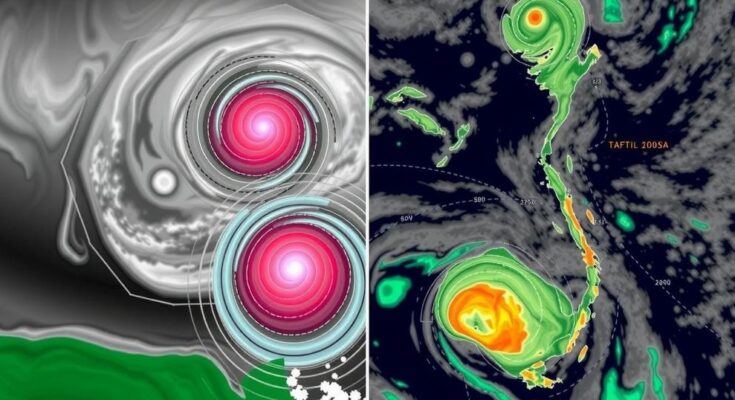Storm Darragh caused extensive disruptions across the U.K. and Ireland, leaving many without power and prompting flood warnings after severe wind gusts resulted in fatalities. In parallel, Thailand and Malaysia faced fatal flooding due to monsoon rains, necessitating significant government response and highlighting vulnerabilities due to climate change.
In the aftermath of Storm Darragh, the U.K. and Ireland faced significant disruptions, with hundreds of thousands left without electricity due to wind gusts reaching 154 kilometers per hour (96 miles per hour). As the fourth designated storm of the 2024-25 European windstorm season, Darragh prompted numerous flood warnings, especially in areas still recovering from the impacts of Storm Bert. Tragically, two fatalities were reported as falling trees caused accidents on the roads.
The Met Office issued a rare red weather warning for Storm Darragh, an alert characterizing potentially life-threatening conditions, resulting in flight and train service delays. Emma Pinchbeck, chief executive of the government’s climate advisory body, emphasized the urgent need for the U.K. to enhance its planning for extreme weather, highlighting concerns over insufficient flood defenses and housing developments on flood plains.
Meanwhile, Thailand and Malaysia faced their own calamities from severe flooding linked to monsoon rains, resulting in 29 confirmed deaths in Thailand and at least six in Malaysia, as tens of thousands of individuals sought refuge in evacuation centers. Educational institutions and nearly 100 health facilities were closed in response to the crisis.
In Thailand, flood relief operations were executed in southern provinces, with financial aid approved for affected families. Pianporn Deetes from International Rivers attributed the excessive flooding partly to human activities such as deforestation and dam construction. Concurrently, Malaysia’s east coast endured record rainfall, leading to widespread agricultural losses estimated at approximately 1 billion ringgit ($226 million) and severely affecting recently planted rice paddies. The Malaysian government is considering financial assistance for impacted farmers while prioritizing repairs to essential infrastructure.
The article discusses the severe impacts of Storm Darragh in the U.K. and Ireland, threatening lives with high winds and resultant flooding just weeks after the region was affected by another storm. It also highlights the substantial flooding crises in Thailand and Malaysia caused by monsoon rains, resulting in loss of lives, significant property damage, and the need for governmental assistance for affected communities. This juxtaposition of disasters illustrates the ongoing challenges of climate-related events in different regions and highlights the call for better preparedness and infrastructure support in facing such extreme weather events.
In conclusion, the events surrounding Storm Darragh in the U.K. and Ireland, alongside the flooding crises in Thailand and Malaysia, underline the perils associated with severe weather patterns exacerbated by climate change. Both regions exhibit vulnerabilities that necessitate improved infrastructure and emergency preparedness to mitigate future disasters, particularly in terms of flood defenses and appropriate urban planning.
Original Source: news.mongabay.com




